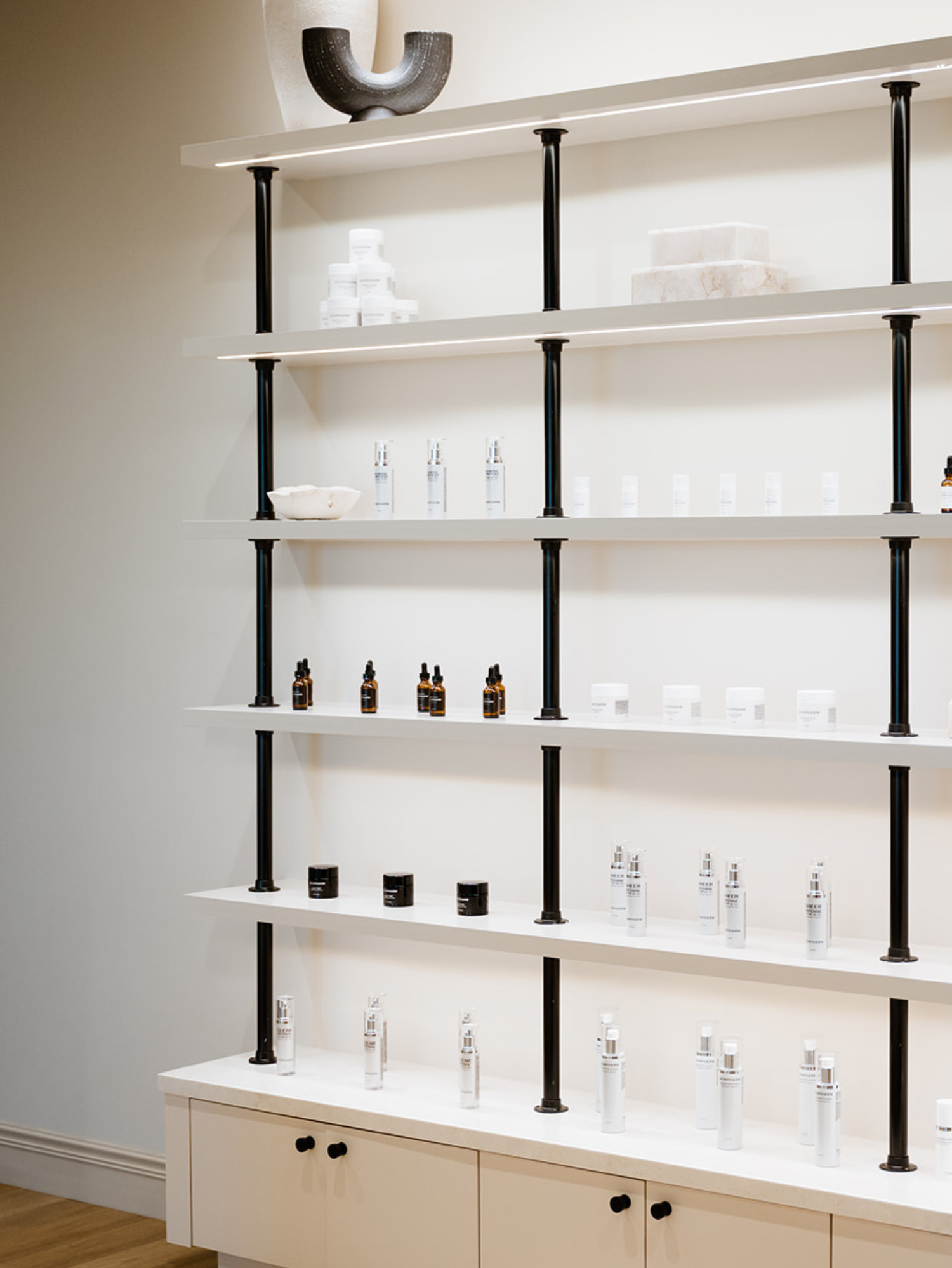Shop skin care
Clinics
VISIT OUR 11 CLINICS →
HOURS
Monday – Friday
9:30a – 5:30p
How Hyaluronic Acid + Vitamin C Work Together to Create Amazing Skin
by Skin Pharm September 17, 2024

There aren’t very many more iconic duos than hyaluronic acid and vitamin C.
That’s why you may have noticed that they seem to be everywhere these days. However, atSkin Pharm, we don’t buy into products that are just hype.
We wanted to make sure we’re using ingredients with proven benefits so that we can help you reach all of your skin care goals. That’s why we did a deep dive into both ingredients separately and how they work together to create amazing skin so that you can be as convinced as we are about how incredible they are.
Hyaluronic acid 101
You may be familiar with salicylic acid and glycolic acid ingredients, which are excellent and effective skin exfoliants. However, although it is also technically an “acid,” hyaluronic acid doesn’t fall into the AHA, BHA, or PHA category.
Instead, hyaluronic acid is considered a glycosaminoglycan, a vital sugar molecule found naturally in the skin (mainly in the joints and the eyes).
That doesn’t mean it’s any less excellent oreffective, only that it works differently. Instead of exfoliating the skin, like most other acids, hyaluronic acid is an incredibly efficient moisturizer.
This is directly related to its status as a humectant, meaning that it helps the skin retain as much moisture as possible. In fact, hyaluronic acid can actually hold onto 1000x its body weight in water.
Once the water is in the skin, the ingredient can also prevent it from evaporating back out.This is because hyaluronic acid creates a barrier for the skin — one that seeps all moisture inside and doesn’t let it escape back out.It helps to think of hyaluronic acid like a sponge. It seeks out and binds with water molecules, helping pull them into the epidermis - the outer layer of the skin.
Benefits of hyaluronic acid include:
- Moisturizing and hydrating the skin
- Decreasing the appearance of fine lines and wrinkles
- Enhancing the firmness and elasticity of the skin
- Repairing and regenerating the skin
While anyone can benefit from using hyaluronic acid, people looking for a way to deal with aging skin may see the most benefits.
As we age, the natural levels of hyaluronic acid drop, just like how they do with collagen and elastin. Having a way to replenish them is a huge benefit.
Vitamin C 101
Even if you haven’t heard of hyaluronic acid, we’re confident that you’ve heard ofvitamin C. Not only is it a potent antioxidant that your entire body not only needs but benefits from, it is also beneficial for multiple skin concerns. You may see it on product ingredient levels as “ascorbic acid.”
If you’re not sure what an antioxidant is, it’s a compound that can help to stabilize the unstable molecules that bounce around in the body. Unfortunately, during that search process, the damage is done all over the body, which leads to things like premature aging and other health issues.
Vitamin C is actually the most studied of all antioxidants, especially when it comes to topical use.
Here are just a few of the reported benefits:
- Protection against ultraviolet radiation
- Prevents premature aging by protecting the skin from oxidative stress
- Boosts the synthesis of collagen and elastin.
- Reduces hyperpigmentation
- Brightens and evens out the skin
- Exfoliates the skin
Vitamin C is so impressive, in fact, that it’s one of the basicrequirements set out by the FDA. It’s essential for everyone to get enough vitamin C in their diet because it also helps with immune function and wound healing.
Luckily, most of us get plenty of vitamin C without even knowing it, through eating fresh fruits and vegetables, along with other vitamins and minerals. It’s the perfect example of why you have to talk about a well-rounded, whole-body approach to your skin. Just treating it from the outside isn’t enough.
As we briefly touched on, Vitamin C is also thought to be one of the keys to synthesizing new collagen and elastin. These are two things that are essential to keeping you looking youthful and radiant, even as you age.
Why are hyaluronic acid and vitamin C so great together?
Because of their unique and powerful benefits on their own, both hyaluronic acid and vitamin C together are a powerhouse duo. Each possesses something that the other doesn’t, which means they can balance each other out.
In addition, vitamin C may tend to dry the skin out when used in too large quantities, especially for those with naturally sensitive skin. Paired with hyaluronic acid, vitamin C can do the job it was made to do without having as many negative impacts on the skin.
This is especially true in more delicate areas, like the eye area. Vitamin C alone may be too much for it, but the area can see improvement when combined with hyaluronic acid while also staying hydrated.
This duo is especially successful at protecting the skin from sun damage without drying it out.Vitamin C protects against UV rays by supporting skin cells during exposure to free radicals. Then, hyaluronic comes in to restore moisture and keep your complexion looking and feeling replenished. Hyaluronic acid doesn’t stress your skin — it hydrates and replenishes your complexion while vitamin C brightens and protects.
When applying these two ingredients separately instead of in a single serum, you’ll want to first apply your vitamin C serum. After giving it time to absorb into the skin, hyaluronic acid goes on to help keep the product in the skin while also providing additional moisture to keep the skin hydrated. Think of hyaluronic acid like a protective rain coat.
It’s important to note that, although hyaluronic acid and vitamin C are a great tag team, there are plenty of ingredients out there that are not. Always make sure that you do your research before using or combining skin care products, as some can increase your skin’s sensitivity or even make each other less effective.
Are there any risks to using hyaluronic acid and vitamin C together?
Luckily, the combination of hyaluronic acid and vitamin C is safe and effective unless you have an allergy. However, before starting any new skin care regimen, make sure that you perform a patch test.
To do a patch test, use a small amount of hyaluronic acid and vitamin C serum on an out-of-the-way (but easy for you to see) area of your face. Watch the area for 48 hours, monitoring signs of redness, irritation, hives, or other potential negative reactions.
If your skin hasn’t shown any sensitivity within 48 hours, you should be safe to start using it on your entire face! Keep in mind that patch tests aren’t always going to catch 100% of the sensitivities. Start slow when incorporating new products and give your skin plenty of time to adjust.
You’re also far more likely to see a reaction from vitamin C than you are to hyaluronic acid, as it’s a normal compound in your body. If you do have sensitivities, you may want to try just using a hyaluronic acid serum to see if that makes any difference. And always moisturizer, even after using hyaluronic acid. The skin craves hydration and moisture, so many signs of aging and other skin care issues result from dry and potentially dehydrated skin.
What products are out there?
If you’re looking for ways to start incorporating the benefits of hyaluronic acid and vitamin C into your life, you’ve come to the right place. Skin Pharm offers options so that you can create your perfect skin care routine in no time flat.
Take ourYouth Serum, for instance. This anti-aging serum, complete with peptides, is a true multitasker for any skin. It helps to tackle anything from fine lines and wrinkles to dryness, hyperpigmentation and uneven texture.
The star of the show is its multi-weight hyaluronic acid, which works to both instantly plump and firm the skin on application. It’s the perfect lightweight hydration agent to add to your routine, especially if you’re trying to deal with the signs of aging skin (or to prevent them from occurring in the first place).
When it comes to vitamin C serums, we have you covered there too.
Our holy grail vitamin C serum,Glow Factor, works to even the skin tone and promote collagen growth while also protecting the skin against the effects of free radicals and oxidative stress. It’s made from one of the most biologically active forms of vitamin C, L-ascorbic acid and other powerful antioxidants to up the ante even further. It’s perfect for all skin types.
To sum things up...
Hyaluronic acid and vitamin C are both amazing on their own and an unbeatable duo when paired together. Using them to help fight off visible signs of aging or bring back that healthy, radiant glow that you used to have can transform your skin.
Stick withSkin Pharm for all of your skin care needs. We’re with you through every step of the process. You deserve to love the skin you’re in – after all, we only get one!
This article was medically reviewed byMadeline Stoffer, MSN, NP-BC, a board-certified nurse practitioner with six years of experience in cosmetic dermatology.
SOURCES:
Vitamin C in dermatology | PubMed
Interactive Nutrition Facts Label - Vitamins and Minerals Chart | FDA
Also in Blog

Botox: It’s Not Just for Wrinkles!
by Maegan Griffin January 16, 2025
We love Botox and Dysport injections, and we’re not ashamed to admit it!

















